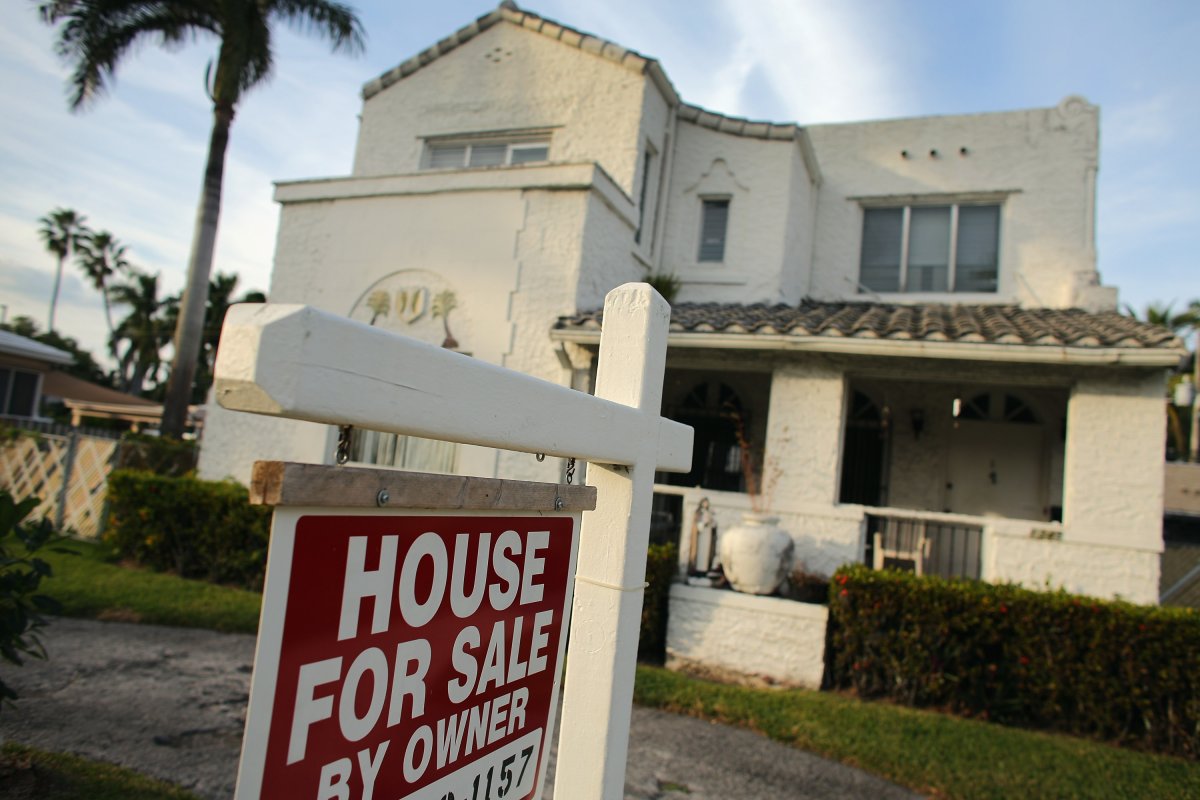These are hard times for all home buyers across the country. And yet, some are even worse off than others.
While mortgage interest rates have recently increased and home prices have reached record heights in the past few months, first-time home buyers are being squeezed out of the market. Home prices are now 34 percent higher than they were two years ago, with prices that have continued to grow month-on-month in April, according to data published by the Federal Housing Finance Agency (FHFA) on Tuesday.
But while the housing market is bad for buyers all over the country, home prices have grown disproportionately in certain areas, leading some to raise concerns of a potential housing market crash.
According to Mark Zandi, chief economist at Moody's Analytics, "the most overvalued markets are in the South and Southwest," in those areas where home prices got "juiced up by remote work" during the COVID pandemic.
According to Moody's Analytics, these are the cities with the most overvalued homes in the nation:
- Boise City, ID
- Colorado Springs, CO
- Las Vegas, NV
- Phoenix, AZ
- Coeur d'Alene, ID
- Tampa, FL
- Atlanta, GA
- Fort Collins, CO
- Sherman, TX
- Jacksonville, FL
- Idaho Falls, ID
- Lakeland, FL
- Greeley, CO
- Longview, WA
- Charleston, SC
- Albany, OR
- Denver, CO
- Clarksville, TN
- Greensboro, NC
- Charlotte, NC
"Carolinas, Atlanta, down into Florida, parts of Texas and then the Mountain West. You could draw a line from Boise all the way down to Phoenix and Tucson —and all the major metropolitan areas on either side of that line are meaningfully overvalued," Zandi tells Newsweek.
Thomas LaSalvia, senior economist at Moody's Analytics, confirms that things are worse in "many places in the Sun Belt where there has been some migration over the last couple of years, and really those with sustained migration over the last couple of decades."
"You got a lot of people leaving the Northeast and moving into the south over into Texas, and a lot of people leaving California and Seattle and moving into the Mountain West and Texas. And that's caused prices to go skyward," says Zandi.
"Places like Phoenix —metro area—, Las Vegas, Reno, Boise—so up through the Southwest and the Mountain West, they've seen price appreciation really at record levels," LaSalvia tells Newsweek.
"We're talking 20, 30, 40 percent [increase] for single-family homes in some of these metros. And a lot of that was, of course, due to demand pressures from out-of-state folks. Whether it's second homes or moves," LaSalvia explains.
According to LaSalvia, many of the out-of-state people who migrated to these cities came with "large savings accounts from selling their home in a higher-priced area or large remote work incomes" to areas where the local population had a substantially lower income. With this money, they pushed local buyers out of the market in bidding wars for purchasing homes.
In time, this dynamic also attracted "flippers," says Zandi, speculators attracted by the strong price gains who have flocked to the market with the idea of buying a house only to sell it "for a quick buck."
"But if that was kind of more of a one-time shock, then future demand is going to have to come from those locals," says LaSalvia, explaining that the conditions that have led to the housing market heating up in those cities cannot be sustained in the long term, and prices will eventually cool down.
"We're already seeing a lot of that in those types of markets where a larger and larger share of listed homes are seeing price cuts. And I would expect that to happen. Now, I don't expect 30 percent declines or anything like that, but 5 to 10 percent is very much on the table."
LaSalvia and Zandi do not believe the market is heading towards a crash—on the other hand, they expect the market to cool down.
"I don't think we're going to see a crash for a number of reasons. One, the market is very tight, in the physical market. Vacancy rates are pretty close to record lows and for the sale market, they are at record lows," says Zandi.
"Lending has been very, very good since the financial crisis. Underwriting has been strong. The 30-year, 15-year fixed rate mortgage is nothing exotic, nothing complicated. And you need lots of defaults and distressed sales to get prices to fall sharply. And I just don't see that happening. And finally, you've got a lot of investors, institutional investors in the market and lots of capital that are going to be very opportunistic and will step in to buy," Zandi explains.
"I see a very significant correction in the housing market, particularly in the most juiced markets and the South and the West. But I don't see a crash," he adds. "I think that would be very unlikely. It would only happen if we got perhaps into some kind of stagflation environment, with very high interest rates and very high unemployment. But that doesn't seem likely."
Zandi said he would expect Colorado Springs to be a market that will see "some significant price declines" in the near future.
"But having said that, you have to put it into context because prices in those markets are up 30 percent over the past year," Zandi says.
"They went up 60, 75 percent over the past two-three years. So, in some sense, these markets are just giving back a small part of what gains they've experienced in recent years."

Uncommon Knowledge
Newsweek is committed to challenging conventional wisdom and finding connections in the search for common ground.
Newsweek is committed to challenging conventional wisdom and finding connections in the search for common ground.
About the writer
Giulia Carbonaro is a Newsweek Reporter based in London, U.K. Her focus is on U.S. and European politics, global affairs ... Read more
To read how Newsweek uses AI as a newsroom tool, Click here.








